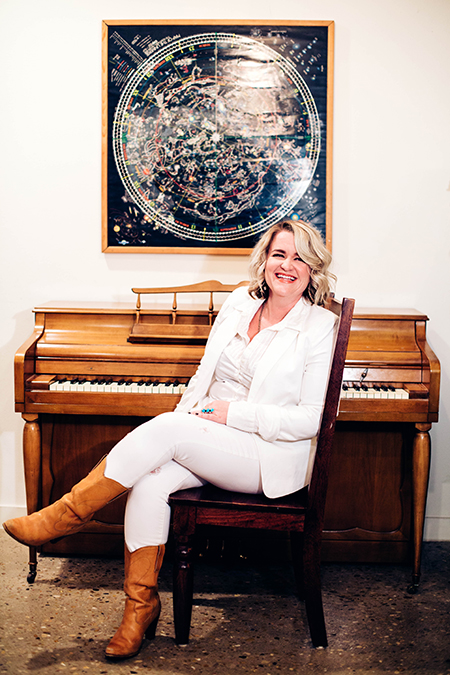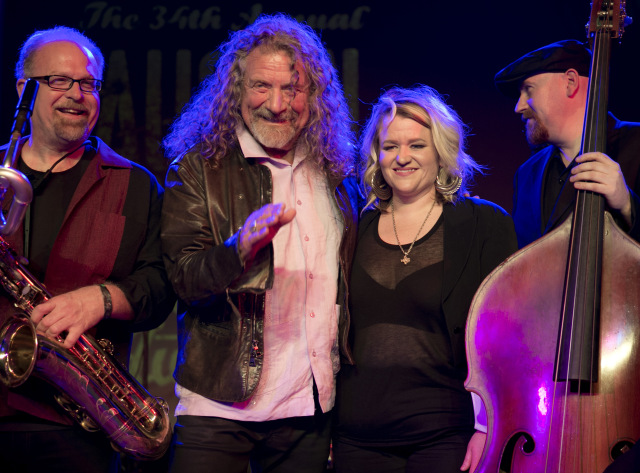5 Questions with an Industry Professional: Vocalist & Pianist Emily Gimble
 Texas vocalist/pianist Emily Gimble is very busy. She's so innudated with gigs and recording sessions in fact, that it took some serious schedule juggling to make this interview happen. Though she's already toured around the world with a variety of Texas artists, last year she released her solo debut with the EP "Certain Kinda," a record full of original songs and sounds written with the help of Andrew Trube of the Greyhounds.
Texas vocalist/pianist Emily Gimble is very busy. She's so innudated with gigs and recording sessions in fact, that it took some serious schedule juggling to make this interview happen. Though she's already toured around the world with a variety of Texas artists, last year she released her solo debut with the EP "Certain Kinda," a record full of original songs and sounds written with the help of Andrew Trube of the Greyhounds.
"I play with Hayes Carll a couple weekends out of the month, and play under my own name with a jazz trio at least once a week," Emily explained. "I just started teaching private voice lessons through the non profit, Anthropos Arts. Anthropos is a non-profit that provides free music lessons to junior high & high school students who could not otherwise afford it."
On top of session work and all her gigs, Emily plays with her dad, Dick Gimble, the Marshall Ford Band, Flat Top Jones, Heybale, and Redd Volkaert. In between that busy schedule, Texas Music Office Marketing Specialist Marc Fort recently caught up with the super busy Texas music vocalist and pianist for the "5 Questions with an Industry Professional" interview series to discuss her creative process, what her current live equipment looks like, and what it was like growing up in a family that has produced 3 generations of some of the most talented Texas musicians in the state's history. (You can hear a small sample of Emily's recorded discography via the Spotify playlist below at right...)
TMO: Obviously your grandfather (legendary fiddle player Johnny Gimble), and father (bassist/guitarist/college professor Dick Gimble) had to be influences as you grew up, but can you tell us what your family musical experiences were like? And what you learned from those experiences…?
Emily Gimble: "My family musical experiences are some of the greatest moments I will have in this life.
"Musical experiences with my family were encouraging, inspiring, intimidating, hilarious, & spiritual. They range from singing Grandpa Jones 'Mountain Dew' with the family at Christmas time to sitting next to Merle Haggard and Papa playin twin fiddles on “The Waltz you Saved for Me” before a gig at Gruene Hall.
"My grandfather played music simply because he loved the music and he loved people.
"I can’t tell you how many times I have people come up and tell me the story of the first time they got to hear Johnny Gimble play. While recounting their story they always have this sparkle of joy in their eye, just like he did when he played for you. It amazes me how infectious his spirit was, so much I can still see it in their memories.
"I hope to never stop learning from him and all the extended members of the musical family here in Texas and beyond."
TMO: You’ve played with many different groups and Texas musicians over the years including Marshall Ford Swing Band, Asleep at the Wheel, Hayes Carl, and Warren Hood. What are some good tips you’ve picked up that you can share for bands that are playing those long dancehall gigs that involve two sets a night, as well as those gigs that require you to learn new songs at the last minute?
Emily Gimble: "When I have a marathon day of jobs or just have a few performances in a weeks span, it’s the same story. You must stay positive and and keep your ears peeled. Trying your best to keep a positive vibration will help the energy of the entire group to stay up. Start times will change, people will be late, your equipment will fail, the sound might suck, the bass players cat might be sick, it’s going to be hot (you’re in TEXAS), try your best to find something good in the situation or laugh about it and just have a good time…you’re playing music!
"Almost every job requires learning songs on the spot at some point. The more you play the better your ear will get at hearing changes before the happen."
TMO: We just ended Women’s History Month this March. Who are some of your favorite Texas women musicians/artists that you think folks should discover (either currently, or through Texas music history), but might not be super well known within popular culture?
"Well, Cindy Walker is the end all be all of Texas women in music.
"Lisa Pankratz is the bees knees and from Travis County!
"Two of my favorite women to play with in Texas are Albanie Falletta & Katie Shore. I also love listening to and playing with Jazz Mills & Stephanie Hunt."
TMO: What does your touring equipment look like? Can you give us a run-down of what your gig bag looks like? And can you also let us know (since you’ve played music all over the world), what are some important little things that you’ve discovered to be invaluable while on tour?
 Emily Gimble: "For most jobs I bring the Nord Stage my grandmother kindly gifted me in 2008 when I moved to Austin. It has the best piano sound I have found on a keyboard…computer. I have two amps I switch between, for “quiet” gigs I use a 1962 Fender Pro. For outdoor stages and gigs where I compete with a guitar player I use a 1963 Fender Concert Amp, modified with 2 12” speakers instead of 4 10” speakers. Last year I started bringing a Strymon El Capistan delay pedal, it makes the electronic keyboard patches on the Nord a little more tolerable.
Emily Gimble: "For most jobs I bring the Nord Stage my grandmother kindly gifted me in 2008 when I moved to Austin. It has the best piano sound I have found on a keyboard…computer. I have two amps I switch between, for “quiet” gigs I use a 1962 Fender Pro. For outdoor stages and gigs where I compete with a guitar player I use a 1963 Fender Concert Amp, modified with 2 12” speakers instead of 4 10” speakers. Last year I started bringing a Strymon El Capistan delay pedal, it makes the electronic keyboard patches on the Nord a little more tolerable.
"I always keep lavender oil on hand, in the gig bag. It helps me keep my cool if it’s been a grinding day on the road. Always have an extra quarter inch, power strip, and find a mic to sing on that you dig and bring it to every gig." (Inset photo: Emily Gimble - and Robert Plant, second from left - takes a bow at the Austin Music Awards at the Austin Hilton during South by Southwest on Wednesday March 16, 2016. Photo by Jay Janner of the Austin American-Statesman for Peter Blackstock's article about Emily.)
TMO: Thinking about how your grandfather was just inducted into the Country Music Hall of Fame for his amazing career playing fiddle…any advice that you picked up for the younger players out there that grew up playing classical violin, but want to make the leap to the Texas fiddle style of playing…?
Emily Gimble: "Oh man, get ready to forget everything you’ve learned. I don’t play fiddle currently, but from all the fiddlers I’ve known who have made the transition, it’s a completely different game. Find Wes Westmoreland or Randy Elmore and ask them. Randy holds a fiddle camp every summer and they sit around and play fiddle sun up to sun down, that would be a good place to start."
